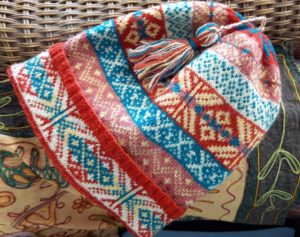Patterns available on Ravelry
Accessories available on Etsy
Here’s a photo of my first kep finished, blocked and tasseled.
Here’s a photo of the same kep being worn in the wilds of coastal Thailand!
I joined a knit-a-long on Facebook because I wanted to build my stranded colorwork skills and thought an online group would be a good way to do this.
It’s been a great experience, and in the process, buying the pattern has helped support the museum on Fair Isle – a very worthy cause indeed.
If you’re interested in knitting one of these hats, you can visit The Fair Isle Fisherman’s Kep Page on Facebook and ask to become a member.
The pattern you purchase gives a lot of helpful guidelines and allows you to choose from a selection of Fair Isle designs to create a masterpiece of your own, also choosing colors that interest you.
For my kep I used a range of colors from Jamiesons of Shetland, in their Spindrift range: ginger, cinammon, buttercup, flax and mermaid.
Happy Knitting!
MikeH



Can you give me advice on the construction of a traditional kep?
Does a kep always have a full lining? How is the brim constructed? I am a Fair Isle knitter in Maine and I design my own patterns (my kits are sold in my local yarn shop) and I have been doing some hats that look like traditional keps, but I want to make sure that they are authentic before I give them the name. Thanks for any help you can give me.
Hi! The kep doesn’t need to be lined but some knitters do add a lining – which is more or less another hat folded inside the kep (without the colorwork). The brim is typically lined, however, and is knit as a section following the knitting of the brim and before the body. The brim is then folded over the lining before blocking. Hope that helps. Best, Michael